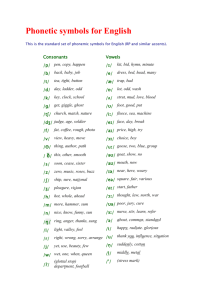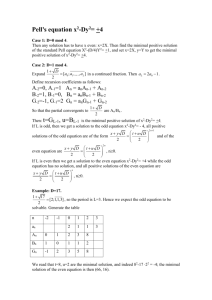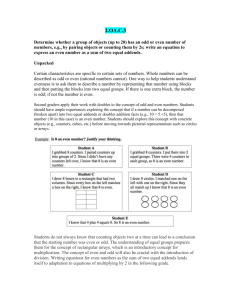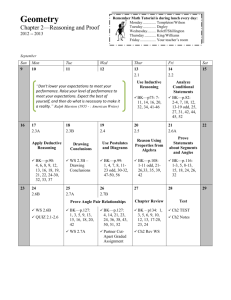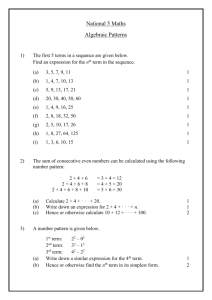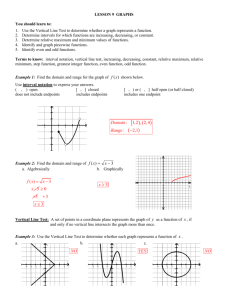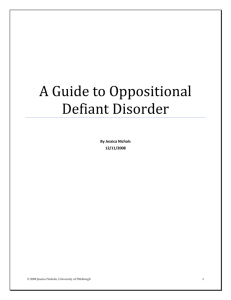Strategies to Work with Students with Oppositional Defiant Disorder
advertisement
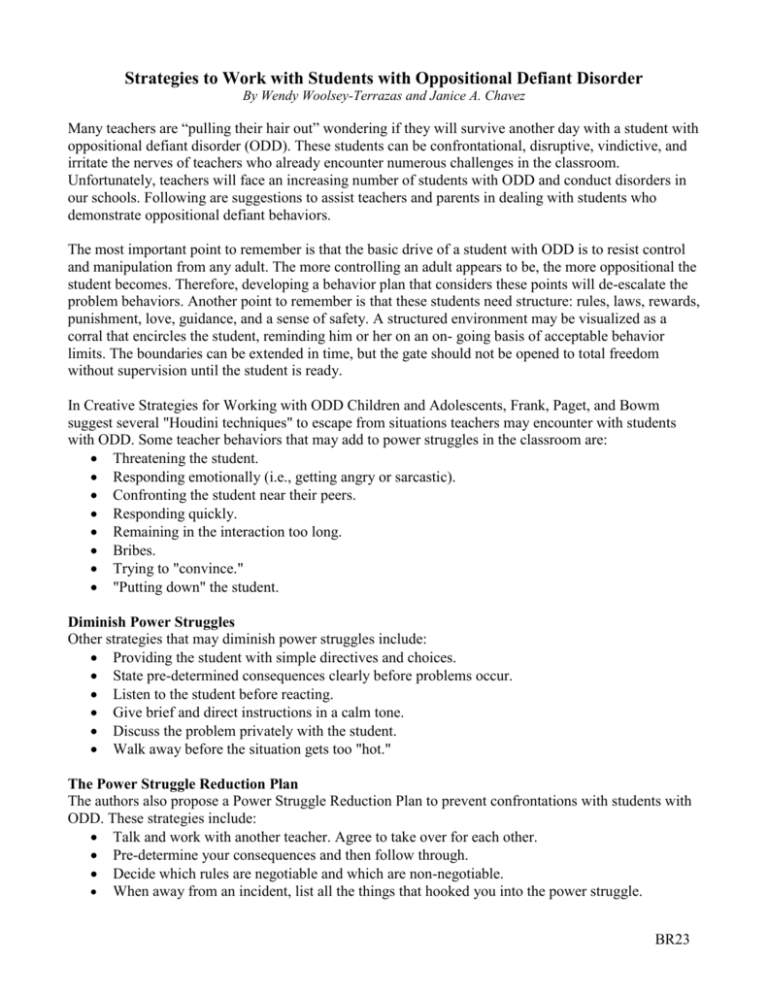
Strategies to Work with Students with Oppositional Defiant Disorder By Wendy Woolsey-Terrazas and Janice A. Chavez Many teachers are “pulling their hair out” wondering if they will survive another day with a student with oppositional defiant disorder (ODD). These students can be confrontational, disruptive, vindictive, and irritate the nerves of teachers who already encounter numerous challenges in the classroom. Unfortunately, teachers will face an increasing number of students with ODD and conduct disorders in our schools. Following are suggestions to assist teachers and parents in dealing with students who demonstrate oppositional defiant behaviors. The most important point to remember is that the basic drive of a student with ODD is to resist control and manipulation from any adult. The more controlling an adult appears to be, the more oppositional the student becomes. Therefore, developing a behavior plan that considers these points will de-escalate the problem behaviors. Another point to remember is that these students need structure: rules, laws, rewards, punishment, love, guidance, and a sense of safety. A structured environment may be visualized as a corral that encircles the student, reminding him or her on an on- going basis of acceptable behavior limits. The boundaries can be extended in time, but the gate should not be opened to total freedom without supervision until the student is ready. In Creative Strategies for Working with ODD Children and Adolescents, Frank, Paget, and Bowm suggest several "Houdini techniques" to escape from situations teachers may encounter with students with ODD. Some teacher behaviors that may add to power struggles in the classroom are: Threatening the student. Responding emotionally (i.e., getting angry or sarcastic). Confronting the student near their peers. Responding quickly. Remaining in the interaction too long. Bribes. Trying to "convince." "Putting down" the student. Diminish Power Struggles Other strategies that may diminish power struggles include: Providing the student with simple directives and choices. State pre-determined consequences clearly before problems occur. Listen to the student before reacting. Give brief and direct instructions in a calm tone. Discuss the problem privately with the student. Walk away before the situation gets too "hot." The Power Struggle Reduction Plan The authors also propose a Power Struggle Reduction Plan to prevent confrontations with students with ODD. These strategies include: Talk and work with another teacher. Agree to take over for each other. Pre-determine your consequences and then follow through. Decide which rules are negotiable and which are non-negotiable. When away from an incident, list all the things that hooked you into the power struggle. BR23 "Walk-by" reinforcements should be brief, even non-verbal, and minimal attention should be drawn. Whisper praises without bringing attention to the student. Leave a positive note for the student to discover. It is critical that the team approach be used in developing an intervention plan to be implemented in the school, home, and community. The team should be composed of not only teachers and other school professionals but also psychologists, psychiatrists, and other medical professionals who work together to insure the success of the student in a variety of settings. Listed below are strategies that have worked for us as parents, teachers, and team members. These strategies, when implemented in a consistent manner, have proven effective in teaching and parenting roles. Don't threaten unless you are willing to carry the threats out. Threatening students with ODD allows them to test your ability to follow through. Clearly define the behaviors you expect. Students with ODD search for the "gray area" to justify their actions. Clearly define the consequences of compliant and non-compliant behavior. This provides a direct relationship between the desired or undesired behavior and the respective consequence and prevents "fueling" an argument. Always be firm and consistent. Students with ODD are constantly looking for an "open gate" and an opportunity to challenge your directives or justify their position. During confrontations, do not allow your emotions to rule. With students with ODD, your anger demonstrates that they are in control. Behave like Clint Eastwood in Dirty Harry — stay cool, calm, and collected under the most challenging situation. Although students with ODD can challenge teachers and parents, they can be our leaders of tomorrow. If directed in a positive manner, they are able to take control of a situation and make things happen. By building on the students' strengths and allowing them to achieve success, students with ODD will feel good about their capabilities and become productive members of society. Permission to reprint was granted to the Parent Information Network, Arizona Department of Education, Exceptional Student Services, by the Council for Exceptional Children, 1110 N. Glebe Road, Arlington, VA 22201-5704. Originally printed in CEC Today, Vol. 8 No. 7, February/March 2002. BR23
